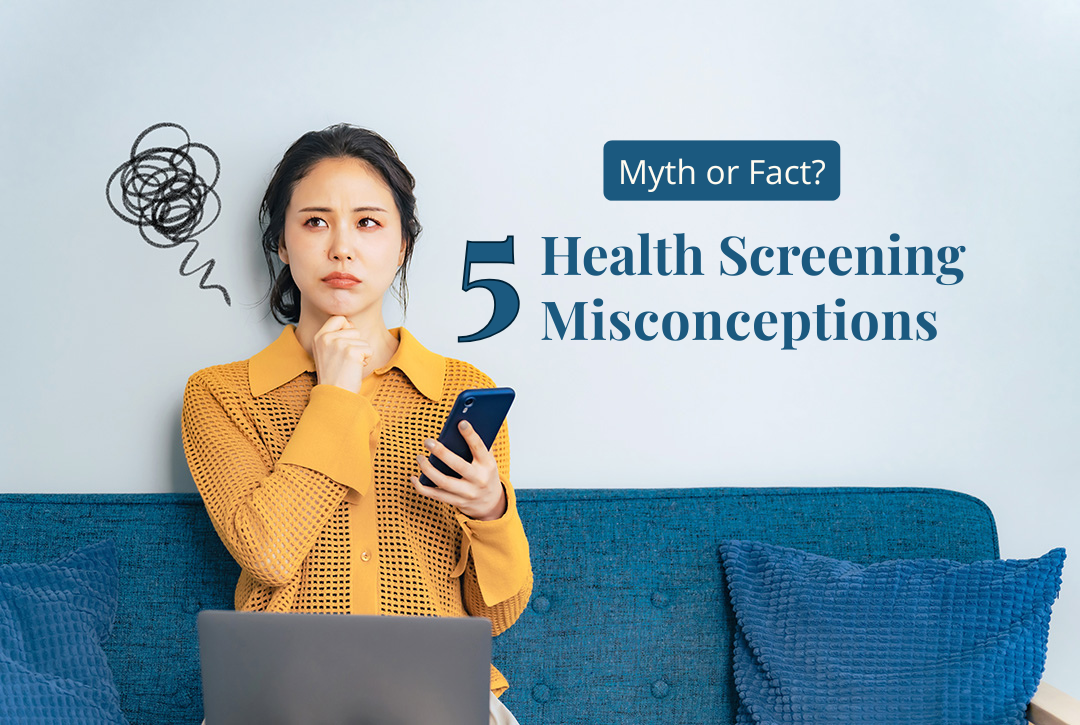Five Health Screening Misconceptions You Need to Stop Believing

You may have heard of certain things about health screenings that made you hesitant to go for one. But are those based on truths or from fearmongering? In reality, health screenings provide valuable insights into your health status, enabling you to seek medical treatment early. This is especially important for those who are entering the prime stage of their lives when they are more prone to chronic diseases.
To help you stay informed about health screenings, here are five common myths debunked.
Myth 1: I don't need health screening if I’m feeling healthy
Many people believe they do not need health screenings if they feel healthy. However, several health conditions can develop without noticeable symptoms in the early stages. These include high blood pressure, high cholesterol, diabetes, thyroid disorders, and most cancers like colon, breast, cervical and prostate cancer. Undergoing regular health screenings can detect these conditions early when they are most treatable.
Myth 2: Health screenings are only for older people
While age is a significant risk factor for many health conditions, it does not mean that younger individuals are safe from them. Conditions such as heart diseases and diabetes could affect individuals of all ages, especially those with significant family history.
Similarly, certain cancers, like leukaemia or lymphoma, can affect anyone. Therefore, routine health checkups may help to keep you abreast of your health status, regardless of your age.

Myth 3: Health screenings are expensive
Health screenings are often perceived as expensive, but that is not always the case. Depending on your preferences and needs, there are many affordable options that won’t break the bank.
When choosing a health screening package, consider factors like your age, gender, lifestyle, budget, health needs, and medical history. Younger individuals with no family medical history may opt for basic health screenings, which are generally less costly.
For those with existing health conditions or a family history of diseases, comprehensive health screenings may be preferred for a more in-depth examination. If you're unsure, it’s a good idea to consult a healthcare professional or refer to our comprehensive guide on health screening. No matter your choice, there is always a health screening option that fits your budget and needs.
Myth 4: Health screenings are painful and inconvenient
Health screenings often involve quick and painless procedures. For example, blood tests or blood pressure checks are usually painless. Some screenings, such as mammograms and Pap smears, may cause mild discomfort but are generally well-tolerated.
Inconvenience can vary depending on individual circumstances and the type of screening. Some health screenings may require specific preparations or fasting beforehand, which may be seen as inconvenient. If fasting is a concern, you can opt for screenings that don’t require it or schedule your appointment early in the morning to minimise disruption to your routine. Despite this, the potential benefits of early detection and prevention far outweigh the inconvenience of doing health screenings.
Myth 5: I don’t need to go for health screening again if I’m cleared the last round
This is untrue. Health conditions can develop or change over time. Some conditions like cancer are fast changing. Therefore, regular screenings can help identify new issues or changes in your health status. Additionally, by keeping your health status in check, it enables you to take proactive steps to seek timely intervention or treatment as deemed necessary. Regardless of your previous test results, it is crucial to follow your healthcare provider’s advice and attend regular health screenings as recommended.
Health screenings provide valuable insights to your health status, and enable you to make informed decisions about your health and take proactive measures towards prevention and management. Conversely, avoiding one could potentially increase the risk of missing an early diagnosis, which might lead to incurring greater long-term medical expenses that would otherwise be avoided.

This article is reviewed by Dr Precelia Lam, General Practitioner, Raffles Medical.















